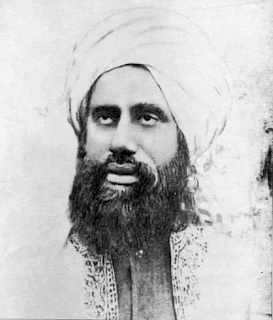The advent of a Mujaddid or a Divine reformer in the new century of Islam after the Promised Massih Hadhrat Ahmad (as) points to a serious spiritual obligation on the part of all Muslims, including the devout Ahmadis. For, the spiritual doctrine pertaining to the renewal of faith in every century of Islam approaches the issue as one of Divine Blessings for acceptance and also, a Divine Trial for rejection. It is incumbent upon all Ahmadis to recognize and accept and help such a Divine Reformer or a Mujaddid, whenever such servants of God make an appearance in the community of believers.
In the Jamaat-e-Ahmadiyya, with the appearance of Hadhrat Munir Ahmad Azim Sahib (atba) of Mauritius as the Divinely-raised Muhyi-ud-Din Khalifatullah- Renewer of Faith and the Khalifa of Allah- , Ahmadi Muslims are increasingly examining the books and other literary works left behind by the spiritual successors of the Promised Massih (as) in the past, to understand the real interpretation and true conception of the spiritual doctrine. Common Ahmadis often wonder about the true status of the institution of Khilafat as it exists in the Jamaat-e-Ahmadiyya.
Many Ahmadis think that Qudrat-e-Saniya or the doctrine of second manifestation of Divine Power means the present Khilafat system in the Jamaat, whereby whenever there is a vacancy on the position of leadership, the community will come together and elect as the head a very sincere member of the Jamaat. By working together under his leadership, the Community can gain progress in all the works that the Jamaat is meant to do. This conception leaves no room for the acceptance of a Divinely raised soul outside of the electoral assembly devised for the purpose of selecting the Khalifa. While one can value and support the instition of man-made Khilafat so long as it retains its purity and limits of doctrinal framework, every one has the duty to be part of the arrangement.
But the moment Allah (twa) raises His Messenger in His Infinite Wisdom, it is the duty of all believers to humbly accept and recognize such a Divine servant. Every episode of the claim of beinga recipient of Divine revelations will necessarily involve a trial for the believers and as such, it shall be the duty of the leadership to show humility and careful deliberation to understand the Divine wisdom its complex setting, rather than seeking to ridicule the Divine Message being poured down through a humble servant of God. Viewed in this way, Ahmadis will be able to accommodate their system of elected leadership within the Divine framework (Sunnat Allah) of sending His Elects among the people till the Day of Judgement.
In the Jamaat-e-Ahmadiyya, with the appearance of Hadhrat Munir Ahmad Azim Sahib (atba) of Mauritius as the Divinely-raised Muhyi-ud-Din Khalifatullah- Renewer of Faith and the Khalifa of Allah- , Ahmadi Muslims are increasingly examining the books and other literary works left behind by the spiritual successors of the Promised Massih (as) in the past, to understand the real interpretation and true conception of the spiritual doctrine. Common Ahmadis often wonder about the true status of the institution of Khilafat as it exists in the Jamaat-e-Ahmadiyya.
Many Ahmadis think that Qudrat-e-Saniya or the doctrine of second manifestation of Divine Power means the present Khilafat system in the Jamaat, whereby whenever there is a vacancy on the position of leadership, the community will come together and elect as the head a very sincere member of the Jamaat. By working together under his leadership, the Community can gain progress in all the works that the Jamaat is meant to do. This conception leaves no room for the acceptance of a Divinely raised soul outside of the electoral assembly devised for the purpose of selecting the Khalifa. While one can value and support the instition of man-made Khilafat so long as it retains its purity and limits of doctrinal framework, every one has the duty to be part of the arrangement.
But the moment Allah (twa) raises His Messenger in His Infinite Wisdom, it is the duty of all believers to humbly accept and recognize such a Divine servant. Every episode of the claim of beinga recipient of Divine revelations will necessarily involve a trial for the believers and as such, it shall be the duty of the leadership to show humility and careful deliberation to understand the Divine wisdom its complex setting, rather than seeking to ridicule the Divine Message being poured down through a humble servant of God. Viewed in this way, Ahmadis will be able to accommodate their system of elected leadership within the Divine framework (Sunnat Allah) of sending His Elects among the people till the Day of Judgement.












